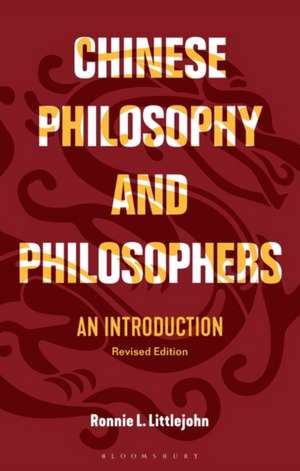Chinese Philosophy and Philosophers: An Introduction
Autor Ronnie L. Littlejohnen Limba Engleză Paperback – 26 ian 2022
| Toate formatele și edițiile | Preț | Express |
|---|---|---|
| Paperback (1) | 151.24 lei 3-5 săpt. | +52.62 lei 7-13 zile |
| Bloomsbury Publishing – 26 ian 2022 | 151.24 lei 3-5 săpt. | +52.62 lei 7-13 zile |
| Hardback (1) | 441.21 lei 6-8 săpt. | |
| Bloomsbury Publishing – 26 ian 2022 | 441.21 lei 6-8 săpt. |
Preț: 151.24 lei
Preț vechi: 182.07 lei
-17% Nou
Puncte Express: 227
Preț estimativ în valută:
28.94€ • 30.95$ • 24.13£
28.94€ • 30.95$ • 24.13£
Carte disponibilă
Livrare economică 27 martie-10 aprilie
Livrare express 13-19 martie pentru 62.61 lei
Preluare comenzi: 021 569.72.76
Specificații
ISBN-13: 9781350177406
ISBN-10: 1350177407
Pagini: 376
Dimensiuni: 156 x 234 x 33 mm
Greutate: 0.57 kg
Ediția:2
Editura: Bloomsbury Publishing
Colecția Bloomsbury Academic
Locul publicării:London, United Kingdom
ISBN-10: 1350177407
Pagini: 376
Dimensiuni: 156 x 234 x 33 mm
Greutate: 0.57 kg
Ediția:2
Editura: Bloomsbury Publishing
Colecția Bloomsbury Academic
Locul publicării:London, United Kingdom
Caracteristici
Organized thematically around four central subjects in philosophy - knowledge, metaphysics, ethics and politics - allowing students studying Western philosophy to quickly get to grips with unfamiliar ideas
Notă biografică
Ronnie L. Littlejohn is Virginia M. Chaney Distinguished Professor of Philosophy and Director of Asian Studies at Belmont University, USA. His previous books include Historical Dictionary of Daoism (2020), Confucianism: An Introduction (2011), Daoism: An Introduction (2009) and Riding the Wind with Liezi: New Perspectives on the Daoist Classic (2011).
Cuprins
List of Focus Windows Preface Acknowledgements Note on Translations Introduction1. Ontology-Questions about the Nature of RealityIntroductionThe Basic Vocabulary of the Chinese Theory of Reality: The "Great Commentary" to the Classic of Changes (Yijing)Daoist Ontology: Lao-Zhuang Tradition (c. 350-139 BCE)A Synthesis of Classical Chinese Ontologies: Masters of Huainan(Huainanzi, c.139 BCE)Buddhist OntologiesThe Study of Principles: Understanding the Content and Structure of RealityShifting Paradigms in Chinese Theories of RealityChapter ReflectionsAdditional Readings and Resources2. Epistemology-Questions about the Nature and Scope of KnowledgeIntroductionA Classical Chinese Model for Justifying Beliefs and Knowledge Claims: Mozi (c. 470-391 BCE)Early Chinese Rhetoricians (bianshi) and LogiciansThe Inadequacy of Reason for the Discovery of Truth: The Lao-Zhuang Tradition (c. 350-139 BCE)Knowledge by Analogical Inference: Mencius (c. 372-289 BCE) Reasoning without Prejudgment: Xunzi (c. 310-220 BCE)Differentiating Belief from Knowledge: Wang Chong (c. 27-100)Buddhist Influenced EpistemologiesPluralistic Cultural Knowledge: Zhang Dongsun (1886-1973)Chapter ReflectionsAdditional Readings and Resources3. Moral Theory-Questions about the Nature and Application of MoralityIntroductionMorality as Cultural Propriety: Confucius (c. 551-479 BCE)Morality as Heaven's Commands: Mozi (c. 470-391 BCE)Moral Effortlessness: Lao-Zhuang Views on Morality (c. 350-139 BCE)Morality as Cultivating Our Inborn Endowments: Mencius (c. 372-289 BCE)Morality as Carving and Polishing the Person: Xunzi (310-220 BCE) Buddhist Thinking about Morality in the Chinese ContextMorality Books and Ledgers: Tract of the Most Exalted on Action and Response (c. 1164)The Ultimacy of Harmony: Zhu Xi (1130-1200) Moral Willing as Moral Knowing: Wang Yangming (1472-1529)Early Modern and Contemporary Reflections on Moral PhilosophyChapter ReflectionsAdditional Readings and Resources4. Political Philosophy-Questions about the Nature and Purpose of GovernmentIntroductionThe Classical Chinese Political Theory of MeritocracyHumane Government: Mencius (c. 372-289 BCE)Legalism's Two Handles of Government: Han Fei (c. 280-233 BCE)Daoist Influenced Political TheoriesGovernment Enacting Social Justice: Wang Anshi (1021-1086)Critique of the Chinese Dynastic System: Huang Zongxi (1610-1695)Re-envisioning Chinese Political Understanding of Government and PoliticsThe Sinification of Marxism in China: Mao Zedong (1893-1976)Forms of Current Confucian Political TheoryChapter ReflectionsAdditional Readings and ResourcesQuick Guide to Pronunciation Comparative Chronology of Philosophers Notes References Index
Recenzii
Ronnie Littlejohn's ability to constructively organize and discuss Chinese philosophy with categories and terms recognizable to undergraduate students while remaining faithful to original discourses is remarkable. This is perhaps the most nuanced introduction Western students can have to classical Chinese thought in a familiar philosophical framework. Any teacher dealing with these texts and ideas should seriously consider this work.
This revised and updated volume offers a lucid and comprehensive overview of the key historical periods and conceptual areas of Chinese philosophy from antiquity to modernity. It is an essential resource for engaging the history and contemporaneity of Chinese thought.
This revised and updated volume offers a lucid and comprehensive overview of the key historical periods and conceptual areas of Chinese philosophy from antiquity to modernity. It is an essential resource for engaging the history and contemporaneity of Chinese thought.
